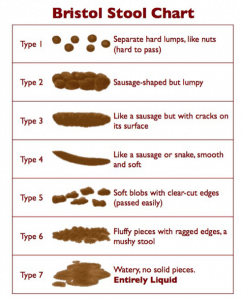What is Constipation and How Can You Treat It
- Treatments, Testing and Diagnosis
It is likely that constipation will affect you at some point in your life. In fact, it is though to impact anywhere between 8 – 50 % of the UK’s population (1).
Unfortunately, because publicly discussing your bowels is not really the norm, you may be left wondering ‘what is constipation’? And, if you suffer with this, you will be wondering ‘what is good fo constipation?’
What is Constipation?
Constipation, can lead to haemorrhoids, bloating, fatigue, lack of appetite and can be a sign of lack of fibre in the diet. Lack of fibre is linked to bowel cancer (2).
So getting in touch with having healthy bowels is an extremely serious issue.
The Symptoms of Constipation (3)
- Are you bloated? If your food is not moving through your gut effectively then this can lead to bloating. Bloating can cause a distended stomach and abdominal pain.
- How often do you open your bowels? We all open our bowels differently and not going every day, doesn’t necessarily mean that you are constipated. Because of this, it is really difficult to give 1 absolute target for everyone. So at the minute it is thought that anything less than 3 times a week indicates constipation.
- How hard is it to go? If you find yourself straining at least 1/4 of the time then this is sign of constipation. Straining can also lead to hemorrhoids which can often cause light coloured blood in your stools. If this does happen then it isn’t anything to panic about but do go and see your GP.
- Is it satisfactory? The technical term for this is ‘incomplete evacuation’ – lovely! But when you open your bowels, are you left feeling like there is still some ‘up there’? This happening 1/4 of the time is again a sign you may be constipated.
- Does it ever get so bad that you need a ‘helping hand’? In some cases it is extremely difficult to go to the toilet and sufferers may end up using their hands to perform what is known as a ‘manual evacuation.’
- What do your stools look like? Below is a chart which dietitians use to monitor a person’s digestive health symptoms. We all tend to get a range of these stools at times but ideally you want to be at a ‘type 4.’ Anything around the 1-3 range is indicative of constipation.

Constipation can have an underlying medical cause, so if you have these symptoms, then please see your GP. Your GP or your pharmacist will also be able to advise you on the best laxatives to take should you need them.
While a ‘medical’ approach may be needed for your symptoms, the more common issue is an unhealthy lifestyle. Constipation comes down to 3 important factors – movement, fluid and fibre. If these 3 factors have been optimised then usually there is no need for medications.
What Is Good For Constipation?
1. FIBRE
Gone are the days where we talk about soluble and insoluble fibre – rather, fibre is actually more varied than these two limiting terms. I feel that having to understand all the different types of fibre is mostly unnecessary and not needed by the average person. Instead, just aim to get a variety of sources in your diet and lots of it.
Fibre works to soften and bulk up your stools so that your body can push it through your bowels and out quite easily. Fibre has the added benefit of bringing bulk to your food – to keep you full and has been linked to reducing cholesterol.
At present, it is recommended that we have 30g of fibre/day and I can guarantee you that the average person does not hit this. You really need to have some effort there. Again counting out fibre is a bit complicated and not really needed other than perhaps for your own interest sake.
‘Good For Constipation’ Top Fibre Tips;
- Have a high fibre carbohydrate at every meal (3 meals/day) e.g. oats for breakfast, brown rice for lunch and sweet potato for dinner.
- Aim for 2 different types of fruit/day – 80g each.
- Have 2-3 different types of vegetables with your lunch and evening meals (80 = 1 portion again).
- If you are still having some issues after these points then try flaxseed in your diet – start off with 1/2 tablespoon and increase slowly to 2tbs.
2. FLUID
The amount of people that come to me with constipation but only drink around 500mls of fluid a day is unbelievable. Your bowels need fluid to function and if you don’t give them enough, things simply dry up.
Oh, and if you increase your fibre and not your fluid then you may find yourself in an even worse state than before as some fibre works by absorbing fluid. If you are dry, this will make things 10 times worse.
The amount of fluid we need is highly individual and there are many recommendations out there depending on age, weight and activity levels. Check your urine to ensure that it is only just a little coloured.
3. MOVEMENT
Let gravity do its work. Sitting at a desk all day is an assured way to get your bowels to become sluggish.
Instead, get a fitness tracker/ spend 1/2 your lunch break walking/ go to the gym/ walk to work etc etc etc.
You can read more about exercise and gut health in my other article here.
Summary
Constipation will affect you at some point in your life and it is a common symptom of IBS.
Ensuring you have a consistently good fibre and fluid intake as well as daily movement can help to prevent constipation.